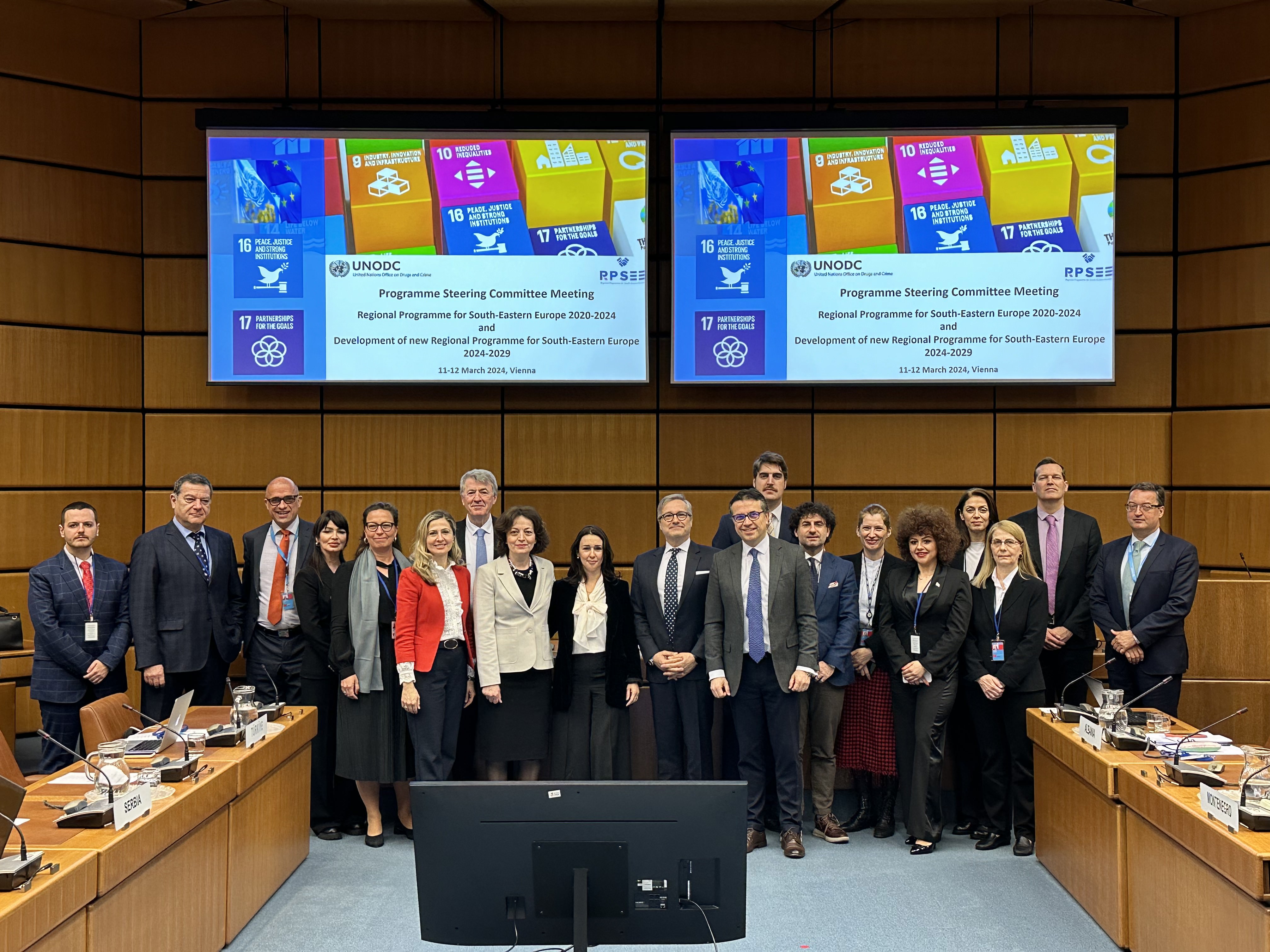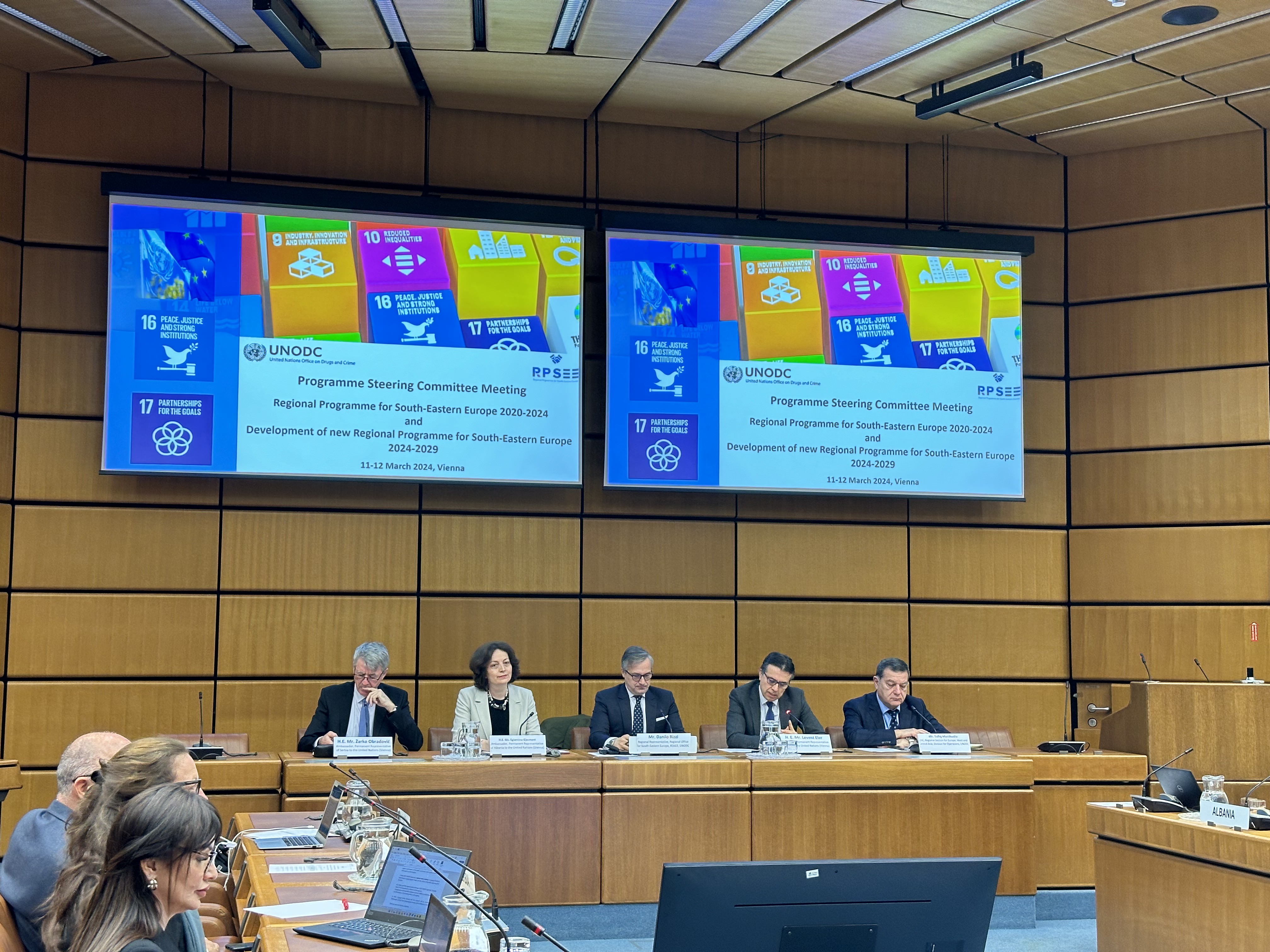On the Crossroads of Evolving Trade and Transit Corridors: UNODC and Partners Agree Priorities for Cooperation on Drugs and Crime in South-Eastern Europe
11-12 March 2024, Vienna, Austria - The United Nations Office on Drugs and Crime (UNODC) recently hosted a meeting of Member States from South-Eastern Europe to discuss priorities for partnership and cooperation on drugs and crime prevention. Coming together in the Steering Committee for the UNODC Regional Programme for South-Eastern Europe, the meeting enabled UNODC to present the results of its work in South-Eastern Europe in 2023 and discuss with its partners both the 2024 work plan and future priorities.
Setting the stage for the discussion, Mr. Tofiq Murshudlu, Officer in Charge of the UNODC Regional Section for Europe, West and Central Asia, noted: “With its strategic location on the crossroads between East and West, South-Eastern Europe plays a key role in facilitating trade across evolving transit corridors. Cross-border cooperation remains essential to address drug and other illicit trafficking and counter organized crime groups, which keep adapting their modus operandi.”
In 2023, UNODC implemented close to 200 activities reaching approximately 4,000 practitioners with targeted training and other capacity development in South-Eastern Europe. “With its inclusive process and adherence to the principle of national ownership, UNODC’s Regional Programme offers countries in South-Eastern Europe not only a framework for tailored support to strengthen the rule of law, but also a platform to export ideas and good practices in the area of drugs and crime”, said H.E. Ms. Eglantina Gjermeni, Ambassador and Permanent Representative of the Republic of Albania.
Other participating Member States also expressed their appreciation and support. According to H.E. Mr. Žarko Obradović, Ambassador and Permanent Representative of Serbia, “The Regional Programme for South-Eastern Europe is a comprehensive tool for continuous cooperation and strategic vision. The support UNODC provides in areas such as anti-corruption, addressing trafficking in persons, firearms and smuggling of migrants is much appreciated.”
The Steering Committee welcomed Türkiye as a strategic partner for cooperation and exchange of good practices in the area of drugs and crime. “Türkiye is delighted to host the UNODC Regional Office for South-Eastern Europe in Istanbul, as a platform for joint work on holistic approaches to addressing the nexus between drugs, organized crime and terrorism”, stated H.E. Mr. Levent Eler, Ambassador and Permanent Representative of Türkiye.
Key results of UNODC’s work in South-Eastern Europe were presented during the meeting. This includes the roll out of drug prevention programs reaching over 500 teachers and 5450 children in 250 schools in 3 countries (Croatia, Serbia, Slovenia). Bosnia and Herzegovina adopted a new strategy against transnational organized crime with UNODC support. Montenegro and North Macedonia introduced new provisions on firearms offenses in their criminal codes. Albania ratified the International Convention for the Suppression of Acts of Nuclear Terrorism (ICSANT).
In 2023, UNODC supported 9 joint inter-agency law enforcement units at land borders, sea and airports throughout the region contributing to significant seizures of illicit drugs and other contraband. Mock trial exercises enabled 150 criminal justice practitioners to get hands-on experience with the handling of human trafficking cases.

UNODC’s support to a regional platform on implementation of the UN Convention Against Corruption contributed to the development and implementation of 4 anti-corruption and asset recovery strategies in 3 jurisdictions (Bosnia and Herzegovina, North Macedonia, Serbia), and 1 MOU facilitating collaboration between the supreme audit institution and anti-corruption agency (in Bosnia and Herzegovina) to more effectively prevent and fight corruption. With a new regional component of the Global Operational Network of Law Enforcement Authorities (GlobE) network launched, international cooperation on asset recovery also advanced.
Introducing the next cycle of the UNODC Regional Programme for South-Eastern Europe, Mr. Danilo Rizzi, UNODC Regional Representative for South-Eastern Europe stated: “With this new iteration of our regional programme, our aim is to provide targeted support that promotes the countries’ prospects for European integration and facilitates progress towards the achievement of the Sustainable Development Goals. Given the diversification of trafficking routes and types of drugs sold on what we can call the Balkan route 2.0, we hope to build on our existing regional partnerships to connect South-Eastern Europe with other parts of the world when it comes to fighting drugs and organized crime”.
The new UNODC Regional Programme for South-Eastern Europe is aligned with the UN Sustainable Development Cooperation Frameworks in the region and envisages a focus on 5 thematic areas: drug prevention, treatment and care; addressing transnational organized crime; anti-corruption and asset recovery; prevention of terrorism and violent extremism; crime prevention and criminal justice.
During the Steering Committee, the participating focal points from each Member State engaged in an interactive discussion on the emerging priorities and challenges that should be incorporated in UNODC’s work in the region. Based on the inputs provided, UNODC will now proceed to finalise the draft programme in partnership with the jurisdictions in the region. The new UNODC Regional Programme for South-Eastern Europe is expected to be launched later this year and run until 2029.
